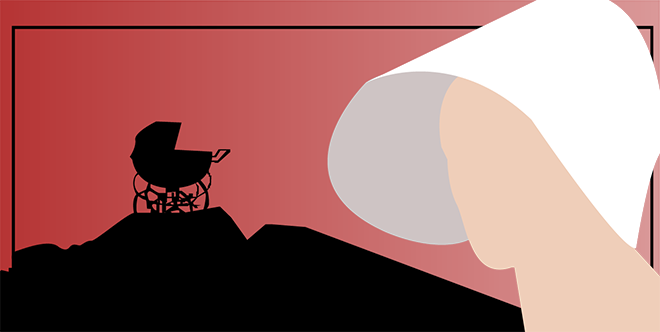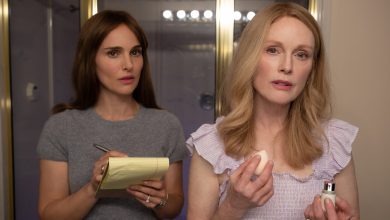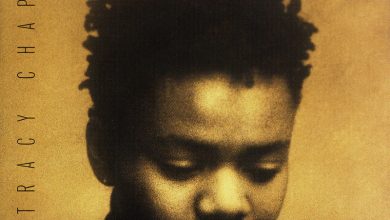When Television Stops Mothering its Mothers

Illustration by Jenny Dodge.
Content warning: rape.
Hulu’s “Handmaid’s Tale” has been making waves with each new episode since its premiere on April 26th. The Hulu show, created by Bruce Miller, is an adaptation of Margaret Atwood’s novel of the same name. It tells the story of a near future dystopian version of America in which a dramatic decrease in fertility has led to a totalitarian theocracy which forces the few fertile women left into enslavement to upper class, powerful men who rape them every month in the hopes of impregnating them.
The protagonist is a mother who has been ripped away from her daughter and husband. She has been placed as a handmaid in the household of a Commander named Fred, owing her the name of Offred. Displaying a horrifying complicity, the Commander’s wife, Serena Joy, holds the handmaid by the arms as her husband quietly forces himself on Offred every month, and dreams of the child she might get to raise.
“The Handmaid’s Tale” has gained attention for the timeliness of its political message and feminist tone (as well as for its cast’s frustrating denial of said feminism). One of the show’s main focuses is the notion of motherhood as a godly gift and dreadful duty to society, often blurring the line between the dystopian genre and straight up horror: the heightened depictions of everyday sexism and absolute, ruthless male control over the cisgender female body are sure to instigate paranoia and terror into any watcher having fallen victim to sexist oppression before.
The horror genre’s appropriation of the experience of motherhood and pregnancy isn’t a new phenomenon (Polanski’s “Rosemary’s Baby” is a famous example of this, which has also been adapted for TV in 2014), but it is especially interesting to observe it in the context of television. Because television is a medium that is consumed in the domestic space and by a very broad audience, it is a highly relevant media to look at when it comes to representation of the domestic life. For the purposes of this article, we will include shows that are provided by streaming websites in this category. Parenthood has mostly been represented on TV in idealized ways, which may not always be as inclusive as what could be expected from the most widespread, democratic of mass media.
From the archetypal, cookie-baking June Cleaver of 50s sitcom “Leave it to Beaver”, to the off-beat, relatable single mom Lorelai in the more recent “Gilmore Girls”, prominent TV Moms have evolved over time, but the take-away often remains an idea of motherhood as an ultimately fulfilling and positive experience. TV narratives about parenthood and motherhood in particular have not waned in presence, and current shows on the subject are numerous: the CW’s “Jane the Virgin”, ABC’s “Modern Family” and “American Housewives”, Bravo’s “Odd Mom Out” and CBS’s “Mom” are a few examples of these light-hearted takes on the subject. Even when shows such as “Jane the Virgin” have been praised for their more realistic depictions of the trials of motherhood and pregnancy, and “Mom” shows some degree of strained intergenerational relationships between the protagonist’s mother, grandmother, daughter and given-up-for-adoption granddaughter, the tone is often fairly forgiving.
This isn’t to say that motherhood shouldn’t still be celebrated in TV today, but it does feel like a breath of fresh air when a show dares to go in a diametrically opposed direction. Shonda Rhimes shows “Grey’s Anatomy” and “Scandal” have notably done some important work in normalizing narratives on abortion. Both shows have featured grown, working women deciding that pregnancy is simply not part of their plans, with “Grey’s Anatomy’s” Cristina Yang casually going against her husband’s desire and having the procedure on her own and “Scandal” actually showing a scene of the protagonist’s unproblematic abortion.
On a different front, Amazon show “Transparent” by Jill Soloway is one of the first prominent small-screen stories centered around a transgender parent. It is the story of Moira, a transgender woman in her 60s coming out to her children and the world around her. The show explores the ways Moira’s children cope with her transition, while exploring what gender and sexuality means to them. Moira’s daughter Sarah notably leaves her husband to live with a woman, offering the show a storyline featuring same-sex parenting of small children as well. “Transparent” dares to normalize a narrative that should no longer be considered daring. In doing so it delivers a wistful portrayal of parenthood as the wonderfully layered experience that it is, and of all the factors that can influence it. Even though the show sadly has resorted to casting a cis-man as Moira (Jeffrey Tambor, who at least has had no problems apologizing for his own role), the story has made a genuine effort to tell a story with subtly different representations of of motherhood, making it every bit as radical as “The Handmaid’s Tale.”
Unsurprisingly, very few experiences of motherhood compare to those shown on television, and a number of them are even completely opposed those of glossy and rosy televised mothers. It is therefore important to provide these other mothers, daughters etc. their own form of representation on television. The media showing a uniformly uncomplicated depiction of certain realities can have a marginalizing effect on those who do not align with it. Because of this, it is essential to give air time to stories that relate to the experiences of those who have for instance chosen against motherhood, had traumatic experiences linked to pregnancy or parenthood, or even those who have lived their lives with toxic motherly figures.
Ultimately, while not all portrayals of motherhood need be as gutting as “The Handmaid’s Tale” or “Rosemary’s Baby” to be revolutionary, these extreme narratives have the merit of shifting the typical discourse, and could hopefully open the world of television to increasingly nuanced stories of motherhood.




